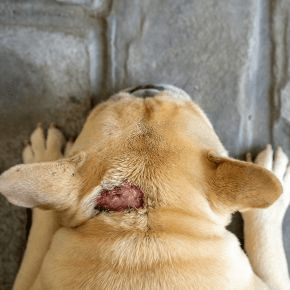Our Vets Discuss Hot Spots on Pets in Surrey

What is a hot spot not? If you're a fan of classic quiz shows, you'll know the answer: Not a good spot! That certainly applies to hot spots on dogs and cats. These red, inflamed and often oozing sores are uncomfortable and can quickly worsen without treatment.
Below, our vets share with pet owners in Surrey, what can cause these hot spots and how to help prevent them. Catch it early if you can and bring your pet in to see our vets at Weybridge and get the issue sorted before it develops.
Book a vet check-up
Causes & treatments for hot spots
Our vets advise that hot spots, also known as acute moist dermatitis, develop when a pet licks, scratches or bites an area excessively, leading to skin irritation and infection. Common triggers include:
- Fleas and parasites - Even a single flea bite can cause an allergic reaction, leading to intense itching.
- Allergies - Food, pollen, dust, or contact allergies can make skin itchy, encouraging excessive licking.
- Skin infections - Bacteria or yeast infections can make the skin sore and inflamed.
- Matted fur - Moisture trapped under mats can create the perfect environment for skin irritation.
- Stress or boredom - Some pets lick or chew at themselves due to anxiety or frustration.
If your pet has a hot spot, prompt treatment is essential to stop it from getting worse. A veterinary check-up at Weybridge can help identify the cause and provide the right treatment, which may include:
- Clipping the fur around the sore to keep it clean and dry
- Medicated washes or sprays to soothe the skin and reduce infection
- Anti-inflammatory or antibiotic medications if needed
- Flea treatments or allergy management to address underlying issues
- A buster collar to prevent further licking or scratching
Our vets in Weybridge explain that keeping your pet's skin and coat healthy is the best way to prevent hot spots:
- Regular flea prevention - Keeping parasites at bay reduces itching and irritation.
- Grooming and coat care - Brushing out loose fur and keeping long coats tangle-free helps prevent trapped moisture and irritation.
- Addressing allergies - If your pet has allergies, speak to one of our vets about management options.
- Managing stress - Enrichment, exercise around Surrey and calming products can help pets prone to stress-related licking.
If your pet has a hot spot, don't wait for it to get worse. Book an appointment with our Weybridge vets to help solve the issue and make your pet comfortable again.

